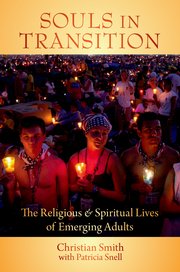
I’ve just begun reading Christian Smith’s new book (with Patricia Snell), Souls in Transition: The Religious & Spiritual Lives of Emerging Adults, and it’s already proving to be a useful resource. This is the follow-up to Smith’s last book (with Melina Denton), Soul Searching, which examined the religious lives of teenagers (ages 13 to 17). Technically, the term “emerging adults” applies to ages 18 to 29, but Souls in Transition only looks at ages 18 to 23. The rest of the “emerging adults” spectrum will be the focus of a planned third book. For an overview of Smith’s findings, check out this recent Christianity Today interview with Smith.
To set the stage for discussing religion and spirituality, Chapter 2 examines “The Cultural Worlds of Emerging Adults” – sex, relationships, morality, and so on. There’s lots of interesting stuff in this chapter – for example, Smith makes the case that emerging adults seem to be living out simplified versions of the philosophies of Jacques Derrida, Stanley Fish, Richard Rorty, and G. E. Moore – but today I’m going to highlight emerging adults’ views of education. As you might imagine, with so many either in college or aspiring to college, education forms an important part of their world view, but their view of education leans strongly to the pragmatic, instrumental value.
Many, though not all, emerging adults believe in the importance of finishing high school and getting a college education. Large numbers want to go to university, do well in school, get a degree, and put it to use. But for most, the motivating reasons behind their valuing higher education seem to have almost entirely to do with the instrumental advantages it produces —as well as the fun one can have while in college. What matters is getting the credits, earning the diploma, and becoming certified as a college-educated persona so that one can get a better job, earn more money, and become a good salary earner and supporter of a (materially) comfortable and secure life. Not very many emerging adults talk about the intrinsic value of an education, of the personal broadening and deepening of one’s understanding and appreciation of life and the world that expansive learning affords. Few talk about the value of a broad education for shaping people into informed and responsible citizens in civic life, for producing leaders and members who can work together toward the common good of all in society…For most, higher education is good instead because —besides the fun one can have while in college —it promises to help secure for individuals more rewarding jobs, higher income, and so greater personal prospects of materials and psychological well-being and security. (Smith, 54)
This attitude is not necessarily new (“Plastics,” anyone?), but elsewhere in this chapter Smith writes of emerging adults’ cultural relativism, desire for material comfort, lack of political or community engagement, and low expectations for changing the world. ESN’s mission is to see Christian scholars become redeeming influences, and InterVarsity’s Vision seeks “world changers developed,” so we are fighting against the current of the culture, according to Smith’s analysis. Since ESN encourages Christian students to pursue academic vocations, this attitude toward higher education can be a challenge to work against; important fields like the humanities can be, well, materially challenging.
Do you agree with Smith? Do emerging adults, ages 18-23, see higher education as primarily a path to middle class security? Have you seen exceptions to this? And, maybe most importantly, do Christian students mirror the culture, or are they a “counterculture for the common good”?
The former Associate Director for the Emerging Scholars Network, Micheal lives in Cincinnati with his wife and three children and works as a web manager for a national storage and organization company. He writes about work, vocation, and finding meaning in what you do at No Small Actors.

Oh absolutely. College is a means to an end, and that end is the opportunity to build careers that are emotionally and/or materially rewarding. It’s not about a quest for knowledge – but then again, most of the people I know were in the physical or social sciences, and we don’t think about our education in terms of “knowledge” so much as “skills.” The difference being that skills are obtained for the sake of how they’ll be applied, while knowledge is obtained for its own sake.
Compound on that the quarter life crisis that everyone my age (late 20’s) is having right now, when we realize we aren’t as happy as we thought we would be by now, and we can’t figure out why. Perhaps it’s because we didn’t know what we wanted out of life when we were in college anyway, or thought it would all work out as planned, and so never knew to ask ourselves the right questions.
I think Amy makes a very good point. The irony of approaching education with a mercenary “skill-seeking” attitude is that such a student also neglects personal development and introspection. I’m reminded of Percy’s student who “made straight A’s in school but flunked life.”
I think that’s an avenue in which Christian college ministries and professors can serve: helping students develop holistically and not just making the grade.